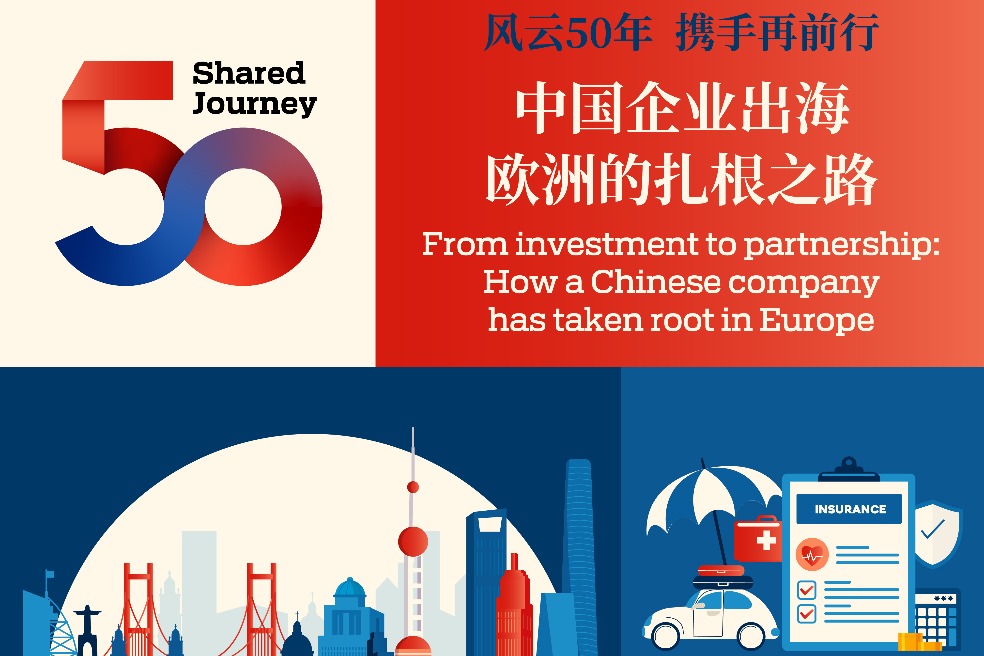EU's protectionist moves compliance with decoupling design of Washington: China Daily editorial
chinadaily.com.cn | Updated: 2024-06-03 19:31

Of the top 25 auto brands, all but three are European. The leading European auto companies are recognized as flag-bearers for European innovation and craftsmanship, and the automotive industry has long been a key driver of Europe's growth, innovation and prosperity.
Yet with the auto industry undergoing a seismic disruption with the transition from internal combustion engines to electrified powertrains and brand differentiation via smartware, new industry entrants are challenging the old guard, with new brands, notably from China, leading the wave of change. In 2022, China reportedly surpassed Germany, Europe's industry leader, in light-vehicle exports for the first time, with exports of about 3 million vehicles, in contrast to Germany's 2.6 million.
It might therefore seem reasonable that European Commission President Ursula von der Leyen should have announced last September the launch of an anti-subsidy investigation into Chinese-made EVs exported to Europe, on the grounds that with the support of state subsidies China has been flooding the continent with its "overcapacity".
That the probe was instigated on the commission's own initiative, rather than based on a formal request by the European car industry indicates the investigation has been politically motivated from the very beginning. Some politicians in the European Union are trying to take protectionist measures against China intending to push forward decoupling at the expense of a rules-based multilateral trade system. This has prompted warnings from some clearheaded politicians in the EU about the negative consequences that any discriminatory trade policies will have on the EU's economy.
Germany's Federal Minister for Digital and Transport Volker Wissing said he was "puzzled that some people are now calling for competition to be restricted by the state", adding that "this has absolutely nothing to do with a market economy". Robert Habeck, Germany's economics minister and vice-chancellor, also warned of the potential damage to the EU's interests should the bloc slap high tariffs on Chinese EVs, saying Europe needs to think about policies that will be beneficial "in the medium and long term".
China has become a major player in the global EV market in recent years mainly due to consistent technological innovations by the country's car producers, a well-established supply chain and full market competition. It has nothing to do with state subsidies as the anti-China axe grinders claim. Yet despite that, the EU has opened a slew of trade probes against China on the grounds of anti-dumping and unfair subsidies, especially in the clean-technology sector, which has markedly increased the risks of escalating China-EU trade frictions.
Given that such investigations are being conducted under false pretexts such as Chinese overcapacity and unfair competition, Commerce Minister Wang Wentao, during a visit to Barcelona, Spain, on Saturday, warned that China will take all necessary measures to defend the legitimate interests of Chinese companies. That some in Europe are rushing ahead with restrictive moves that threaten to derail China-EU economic relations, despite repeated calls from China for dialogue to resolve the differences, sheds some light on the motivating factor for these actions.
US Treasury Secretary Janet Yellen, during a recent visit to Europe, put this in the spotlight when she called on the EU to respond to China's so-called industrial overcapacity in a "strategic and united way".
That China is flooding the European market with EVs is a myth. Chinese automakers account for only 8.4 percent of the EU market, and 50 percent of electric car imports from China come from Western brands that produce cars there. The European automotive industry can only carry forward its brand value by competing in the new context of software-defined electric vehicles, not through the protection of a now redundant legacy status.
It will only bring misfortune on the EU if it falls into Washington's trap by imposing high tariffs on imports of Chinese EVs and other green products, as that will only harm its long-term mutually beneficial relations with its major trading partner.
























